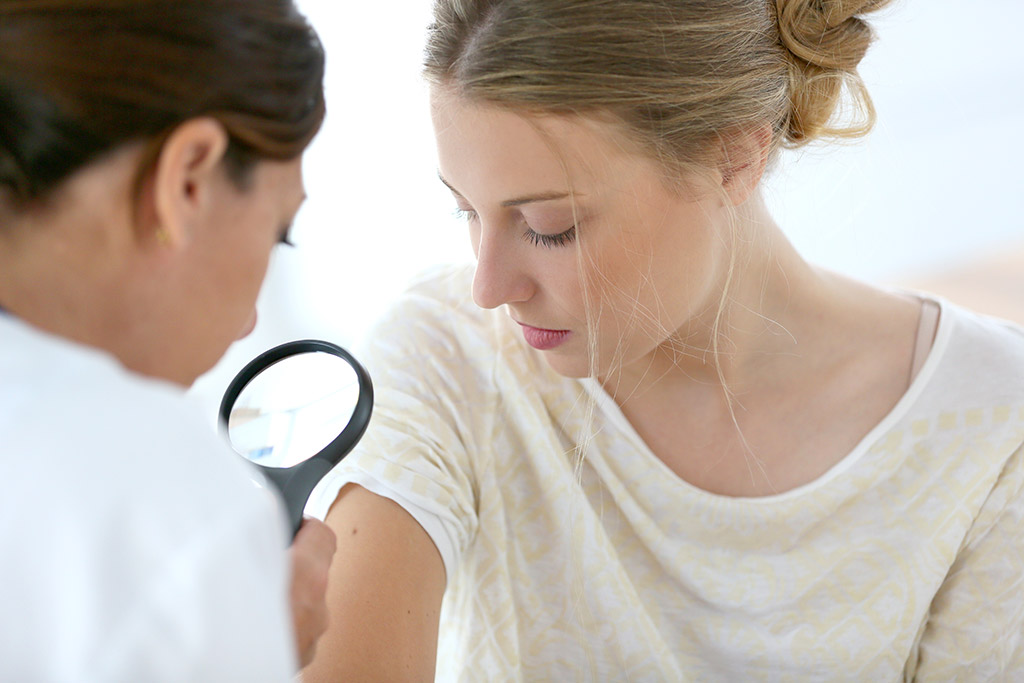
As the body’s largest organ, the skin covers and protects you. It holds body fluids in, preventing dehydration and helps to regulate a consistent body temperature. The skin contains many nerve endings, allowing you to feel heat, cold, pain, itching, touch and other sensations. An important function the skin provides is as a barrier against the microbes that could cause infection. It is through your skin that sunshine enables your body to make vitamin D. Vitamin D is essential to the health of your bones, brain, heart, hormone regulation and many other processes in your body. The skin’s role in your health is important, and when problems occur, Compassion Dermatology can assist you. Contact our Southlake Dermatology practice today.
Over a million persons are diagnosed with skin cancer every year. The most common forms of skin cancer are basal cell or squamous cell carcinoma. Thankfully, these forms of skin cancer can be successfully treated when detected early. Melanoma is another form of skin cancer and is a more serious concern. Thankfully it is not as common, but it is also not as easy to cure as basal cell or squamous cell. An early diagnosis is also essential for improving the odds in the treatment of melanoma. Early detection of these skin cancers is the reason we recommend annual skin examinations. The examination takes very little time and can mean a successful early treatment and a better outcome. Give us a call today to schedule an exam, our Southlake Dermatology practice wants to provide you with the best care possible.
The Annual Exam
The annual exam is especially important for those chronically exposed to the sun, those with a history of Actinic keratoses, or persons who have experienced previous skin cancers. Self-exam is also important. Potential signs of skin cancer can include the following:
- A mole, birthmark or any brown spot that increases in size or thickness, changes in texture, changes in color, is irregular in shape, or is larger than ¼ inch.
- In addition, areas that are painful, itch, crust, scab, erode, bleed or wounds that do not heal within three weeks, should be inspected by a doctor. Most skin cancers are self-detected, so it pays to never ignore these signs. If you experience any of these signs, contact our Southlake Dermatology. Skin cancer that is left untreated can spread to other body organs and tissues.
You should also be aware that persons who are light skinned, have a family history of skin cancer, or those who are over the age of 50 are also at increased risk of developing skin cancer. Compassion Dermatology recommends annual examinations, especially for those at increased risk and over the age of 50 in our Southlake Dermatology.
The Initial Visit for Suspicious Sites
When you schedule an appointment at our Southlake Dermatology clinic for a suspicious site, your doctor will want to know when it appeared, if it has changed any in size or appearance, or if it has exhibited any other warning signs. You may be asked about any family history of skin cancer, previous sunburns and your tanning practices, if any.
During the examination, the site will be examined for the size, shape, color, and texture of the suspicious area, and whether it is bleeding, or crusting. Your entire body may be inspected for additional signs of potential skin cancer. This may include palpating lymph nodes, as some forms of skin cancer can metastasize (spread) to them.
Skin Biopsy
When you visit Southlake Dermatology, if your doctor suspects possible skin cancer, a skin biopsy may be performed. There are different types of biopsy, and the type will be chosen based on the location, size and other factors involving the suspicious site.
A local anesthetic will be used on the biopsy site, and you should not experience any pain during the procedure.
If a tumor has potentially grown into the skins deeper layers, an incisional or excisional biopsy may be performed. An incisionalbiopsy only removes a portion of the tumor. An excisional biopsy will remove the entire tumor. Sutures may be called for.
Biopsy of Lymph Nodes
Basal or squamous cell cancer rarely spreads beyond the skin. However, when it does, it typically first affects the lymph nodes nearest the primary site. If your doctor suspects the cancer may have spread to a lymph node, a biopsy may be provided.
Fine Needle Aspiration Biopsy
A fine needle aspiration (FNA) biopsy may be performed to remove a very small amount of the lymph node. A local anesthetic may be provided. The needle is so fine, discomfort is minimal and may not require an anesthetic. The FNA does not provide as large a sample as other types of biopsy and may not provide the information required. Your doctor will decide on the necessary form of biopsy based the clinical signs present.
Excisional Lymph Node Biopsy
An excisional lymph node biopsy is the surgical removal of the node for microscopic examination. The depth of the lymph node will determine whether it can be removed in our Southlake Dermatology location or will require excision in an outpatient surgical center.
If you have a suspicious mole, a wound that will not heal, or other skin problems, we can help. Remember, annual skin examinations by a professional is the best way to monitor for skin cancer. If you have a suspicious mole, un-healing wound, or other skin problems, we can help. Contact Compassion Dermatology today to schedule an appointment our Southlake Dermatology clinic.


